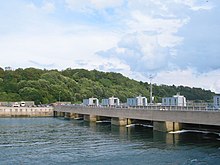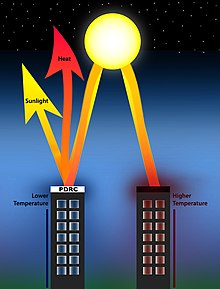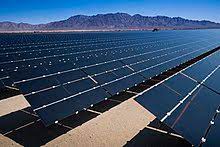Courtesy: Development of alternative energy such as solar
Marine energy

Rance Tidal Power Station, France
Main article: Marine energy
Marine energy (also sometimes referred to as ocean energy) is the energy carried by ocean waves, tides, salinity, and ocean temperature differences. The movement of water in the world’s oceans creates a vast store of kinetic energy, or energy in motion. This energy can be harnessed to generate electricity to power homes, transport and industries. The term marine energy encompasses wave power – power from surface waves, marine current power – power from marine hydrokinetic streams (e.g., the Gulf Stream), and tidal power – obtained from the kinetic energy of large bodies of moving water. Reverse electrodialysis (RED) is a technology for generating electricity by mixing fresh river water and salty sea water in large power cells designed for this purpose; as of 2016, it is being tested at a small scale (50 kW). Offshore wind power is not a form of marine energy, as wind power is derived from the wind, even if the wind turbines are placed over water. The oceans have a tremendous amount of energy and are close to many if not most concentrated populations. Ocean energy has the potential of providing a substantial amount of new renewable energy around the world. # ISO certification in India
| # | Station | Country | Location | Capacity | Refs |
|---|---|---|---|---|---|
| 1. | Sihwa Lake Tidal Power Station | South Korea |  37°18′47″N 126°36′46″E 37°18′47″N 126°36′46″E | 254 MW | [120] |
| 2. | Rance Tidal Power Station | France |  48°37′05″N 02°01′24″W 48°37′05″N 02°01′24″W | 240 MW | [121] |
| 3. | Annapolis Royal Generating Station | Canada |  44°45′07″N 65°30′40″W 44°45′07″N 65°30′40″W | 20 MW | [121] |
Passive daytime radiative cooling can cool temperatures with zero energy consumption or pollution.

Passive daytime radiative cooling
Main article: Passive daytime radiative cooling
Passive daytime radiative cooling (PDRC) uses the coldness of outer space as a renewable energy source to achieve daytime cooling that can be used in many applications, such as indoor space cooling, outdoor urban heat island mitigation, and solar cell efficiency. PDRC surfaces are designed to be high in solar reflectance to minimize heat gain and strong in longwave infrared (LWIR) thermal radiation heat transfer. On a planetary scale, it has been proposed as a way to slow and reverse global warming. PDRC applications are deployed as sky-facing surfaces, similar to other renewable energy sources such as photovoltaic systems and solar thermal collectors. PDRC became possible with the ability to suppress solar heating using photonic metamaterials, first published in a study by Raman et al. to the scientific community in 2014. PDRC applications for indoor space cooling is growing with an estimated “market size of ∼$27 billion in 2025.” # ISO certification in India
Artificial photosynthesis
Main article: Artificial photosynthesis
Artificial photosynthesis uses techniques including nanotechnology to store solar electromagnetic energy in chemical bonds by splitting water to produce hydrogen and then using carbon dioxide to make methanol. Researchers in this field strived to design molecular mimics of photosynthesis that use a wider region of the solar spectrum, employ catalytic systems made from abundant, inexpensive materials that are robust, readily repaired, non-toxic, stable in a variety of environmental conditions and perform more efficiently allowing a greater proportion of photon energy to end up in the storage compounds, i.e., carbohydrates (rather than building and sustaining living cells). However, prominent research faces hurdles, Sun Catalytix a MIT spin-off stopped scaling up their prototype fuel-cell in 2012, because it offers few savings over other ways to make hydrogen from sunlight. # ISO certification in India
Earth infrared thermal radiation
Earth emits roughly 1017 W of infrared thermal radiation that flows toward the cold outer space. Solar energy hits the surface and atmosphere of the earth and produces heat. Using various theorized devices like e missive energy harvester (EEH) or thermostatic diode, this energy flow can be converted into electricity. In theory, this technology can be used during nighttime.

